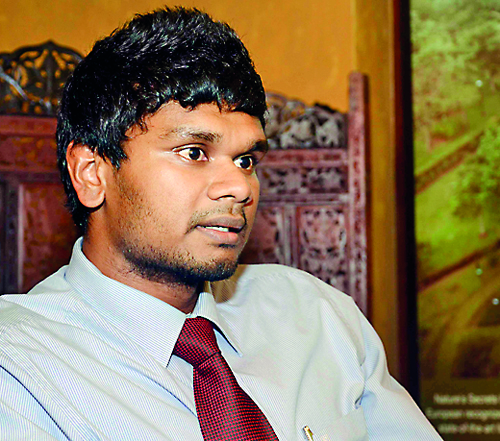Nature’s Beauty Creations steps in to preserve deteriorating soil conditions
Nature’s Beauty Creations Ltd, a natural herbal cosmetics company, is now coming up with a novel type of bio fertiliser aimed at reviving deteriorating soil conditions in Sri Lankan plantations due to application of chemical fertiliser and agro chemicals, a top official of the company said.

A model tea nursery
It has formed Lanka Bio Fertilisers (Pvt) Ltd as a subsidiary to commercially manufacture and market ‘Biofilm’ bio fertiliser developed by a group of Sri Lankan scientists from the ‘Institute of Fundamental Studies’ (IFS) following extensive research and experiments for over 10 years, Samuditha Kumarasinghe, Director Operations of the newly formed company revealed.
He said that the company has invested Rs. 150 million to expand the scope of the IFS scientists’ research to commercial scale from laboratory scale.
It has entered into a partnership with IFS to develop ‘Biofilm’-T the first commercial product of the ‘Biofilm’ family specifically for tea plantations, he disclosed.
Mr. Kumarasinghe, who has a Chemical and B Molecular engineering degree from the University of Melbourne, told the Business Times that he took the challenge of introducing bio fertiliser to Sri Lanka’s tea estates as an initial step of his company with the aim of saving the country billions of rupees in foreign exchange as the importation of fertiliser for the tea sector alone is estimated to cost over Rs. 16 billion per annum.
A 50 per cent reduction of chemical fertiliser in the tea plantation sector by introducing ‘Biofilm’-T will no doubt reduce the importation bill of the country by over Rs. 8 billion per annum, he said.
He noted that Lanka Bio Fertilisers (Pvt) Ltd was established making a paradigm shift from Natural Herbal Cosmetics on the directions of his father Samantha Kumarasinghe, Nature’s Beauty Creations Ltd (Nature’s Secret) Chairman towards entering into commercial

Samuditha Kumarasinghe
manufacture of environmentally-friendly, international standard products.
‘Biofilm’-T is now being manufactured at Lanka Bio Fertilisers’ Hokandara Factory.
He said that his intention is to promote bio fertiliser in plantations country-wide to prevent the heavy use of chemical fertilisers and pesticides in agriculture thereby protecting the people from consuming chemically adulterated food.
Bio fertiliser produced using the microorganisms in the soil such as bacteria and fungi are a breakthrough in the science world to tackle the problem of deteriorating soil conditions.
Prof: Gamini Senevirathne, Senior Research scientist of the IFS in Kandy who was instrumental in inventing Biofilm told the Business Times, their research on developing a novel type of bio fertiliser by combining two or more types of bacteria and fungi to form beneficial microbial communities was started following the finding of one his PHD students Hemali Jayasinghe Arachchi unexpectedly way back in 2002.
This was like the finding of Penicillium which is a genus of ascomycetous fungi of major importance in the natural environment as well as food and drug production, he said adding that his student’s detection of this new fungi on the small glass plate gave him a jolt as he was almost thrown down the seat.
The IFS team started the research around 2003 and the findings led them to develop a bio fertiliser lab scale.
“When we found the positive factors we started to develop this Biofilm into a bio fertiliser in a test tube or in scientific terms in ‘in vitro’ conditions,” Prof. Senevirathne said adding that he took measures to publish the research report in international science journals.

Prof: Gamini Senevirathne
“Thereafter in 2005, we started field research in collaboration with the Tea Research Institute (TRI) for testing this bio fertiliser with tea as well as with other crops,” he said.
The TRI scientists have found that with the use of the bio fertiliser, the NPK fertiliser use can be cut down by 50 per cent and the new product does not contain any pathogenic micro-organisms and is also free from heavy metals such as Cadmium, Arsenic, Lead and Mercury, he revealed.
In 2010, Lanka Bio Fertilisers linked up with the IFS research section to produce Biofilm commercially and it has received the patent from the National Intellectual Property Office, Colombo, he added.
Today the product is in the market as a fertiliser for tea cultivations, he said adding that research is also in progress to extend the use of Biofilm-based bio fertilisers for other crops like rice, rubber, legumes, maize, etc.



